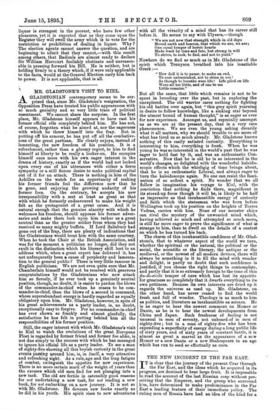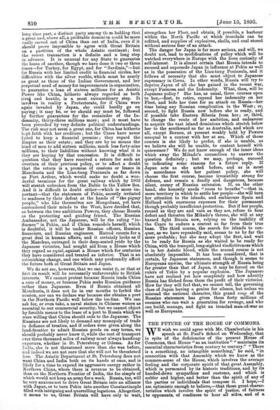THE NEW INCIDENT IN THE FAR EAST.
IT is clear that the journey of the present Czar through the Far East, and the ideas which he acquired in its progress, are destined to bear large fruit. It is impossible to read the account of the last Russian coup without per- ceiving that the Emperor, and the group who surround him, have determined to make predominance in the Far East a leading feature of their immediate policy. The ruling men of Russia, have had an idea of the kind for a long time past, a distinct party among th4m holding that a great and, above all, a profitable dominion could be more easily carved out of China than out of India, even if it should prove impossible to agree with Great Britain on a partition of the whole Asiatic continent ; but the recent transaction is a definite and a long step in advance. It is unusual for any State to guarantee the loans of another, though we have done it two or three times—for Turkey, for Egypt, and for " Sardinia,"—but for Russia with her limited credit in financial circles, her difficulties with the silver rouble, which must be nearly as great as those of the Indian Government, and her perpetual need of money for improvements in organisation, to guarantee a loan of sixteen millions for an Asiatic Power like China, hitherto always regarded as both rival and hostile, is a most extraordinary step. It involves in reality a Protectorate, for if China were again invaded by Japan, she could hardly go on paying ; it may be, or we should say must be, followed by further guarantees for the remainder of the In- demnity, thirty-three millions more ; and it must have been preceded by very definite political understandings. The risk may not seem a great one, for China has hitherto kept faith with her creditors ; but the Czars have never failed to keep a financial promise ; they regard the Empire as their estate ; and they are by no means the kind of men to add sixteen millions, much less forty-nine millions, to their liabilities without knowing what it is they are buying by that concession. It is difficult to question that they have received a return for such an overturn of their previous policy, or to affect a doubt that the return is a promise of cessions or leases in Manchuria and the Liau-tung Peninsula as far down as Port Arthur, which would make no doubt a, won- derful terminus for the great railway which by 1902 will stretch unbroken from the Baltic to the Yellow Sea. And it is difficult to doubt either—which is more im- portant—that the statesmen of Pekin, secretly irritated to madness by their defeat at the hands of " the pigmy people," who like themselves are Mongolians, yet have surrendered their minds to the West, have decided that, as between the two ambitious Powers, they choose Russia as the protecting and guiding friend. The Russian Ambassador, not the Japanese, will be the ruling "in- fluence" in Pekin, and if China remodels herself, which is doubtful, it will be under Russian officers, Russian financiers, and Russian engineers. Hatred counts for a great deal in human affairs, and it certainly looks as if the Manchus, outraged in their deep-seated pride by the Japanese victories, had sought aid from a House which they regard as equal, against a House which for centuries they have considered and treated as inferior. That is an astonishing change, and one which may profoundly affect the future both of Great Britain and Japan.
We do not see, however, that we can resist it, or that at first its result will be necessarily unfavourable to British interests. We cannot protest because Russia lends China a sum of money, or because Pekin seeks Russian guidance rather than Japanese. Even if Russia obtained all Manchuria, it does not lie in our mouths to forbid the cession, nor can we declare war because she obtains a port in the Northern Pacific well below the ice-line. We can ask for, or even take, a naval station in Chinese waters as essential to our commercial security, but we cannot object by forcible means to the lease of a port to Russia which we were willing that China should cede to the Japanese. The Russians are not likely to demand any monopoly of trade in defiance of treaties, and if orders were given along the land-frontier to admit Russian goods on easy terms, we should probably never know it, while the cost of transport over three thousand miles of railway must always handicap exporters, whether in St. Petersburg or Odessa. As for India, she is not threatened more than she was before, and indeed we are not sure that she will not be threatened less. The Asiatic Department at St. Petersburg does not want China and India both on its hands at once, and is likely for a time to expend its aggressive energy rather in Northern China, where there is revenue to be obtained, than on the Northern Frontier of India, the fee simple of which would not keep an army for a week. Russia, too, will be very anxious not to drive Great Britain into an alliance with Japan, or to turn Pekin into another Constantinople filled with intriguing and quarrelling legations. Altogether, it seems to us, Great Britain will have only to wait, strengthen her Fleet, and obtain, if possible, a harbour within the North Pacific at which ironclads can be refitted, and supplies of explosives, shells, and coal stored without serious fear of an attack.
The danger for Japan is far more serious, and will, we doubt not, lead to modifications of policy which will be watched everywhere in Europe with the keen curiosity of self-interest. It is almost certain that Russia intends to succeed and supersede Japan in influence at Pekin as well as in the possession of the Liau-tung Peninsula, and it follows of necessity that she must object to Japanese supremacy in Corea. In other words, Russia will try to deprive Japan of all she has gained in the recent war, except Formosa and the Indemnity. What, then, will be Japanese policy ? She has, as usual, three courses open to her,—first, to retire, expend her indemnity on her Fleet, and bide her time for an attack on Russia—her time being any Russian complication in the West ; or, second, to fight Russia now before she is ready, and if possible take Eastern Siberia from her ; or, third, to change the route of her ambition, and endeavour to acquire the vast island dominions which stretch below her to the southward as far as Australia, and which are all, except Borneo, at present weakly held by Powers unequal to a contest with her at sea. Which of those courses is she likely to prefer, if she is unable, as we believe she will be unable, to content herself with quiescence ? We do not know enough of the inner ideas which sway the Mikado's counsellors to answer the question definitely ; but we may, perhaps, succeed in indicating some reasons for a future reply. If Japan acts as she acted before, and as is most in accordance with her patient policy, she will choose the first course, become irresistibly strong for defence, and remain a deadly and dangerous, because silent, enemy of Russian extension. If, on the other hand, she honestly needs " room to breathe "—that is, more territory in which to settle her people—she will turn her attention to the islands, and embarrass Spain and Holland with enormous expenses for their permanent though probably insufficient protection. But if her people, roused as they are and vain as they are, refuse to bear defeat and threaten the Mikado's throne, she will at any hazard fight Russia now, relying on the inability of the Czars to endure a, contest so far from their true base. The third course, the search for islands to con- quer, as we have repeatedly said, seems to us by far the more probable ; but she may adopt the first, and wait to be ready for Russia as she waited to be ready for China, with the tranquil, long-sighted vindictiveness which is in her Asiatic blood, while the second course is not absolutely impossible. It has been considered, that is certain, by Japanese statesmen, and though it seems to Europeans unwise, the ultimate strength of Russia being far greater than that of Japan, it may be forced on the rulers of Tokio by a popular explosion. The Japanese have not realised yet how completely and how adroitly Russia has filched from them the profit of their victories. How far they will feel that, we cannot tell, the governing class of Japan having a genius for silence, but unless we misread the national character, this grand coup of the Russian statesmen has given them forty millions of enemies who can wait a generation for revenge, and who can build, manage, and fight an ironclad man-of-war as well as Europeans.



































 Previous page
Previous page